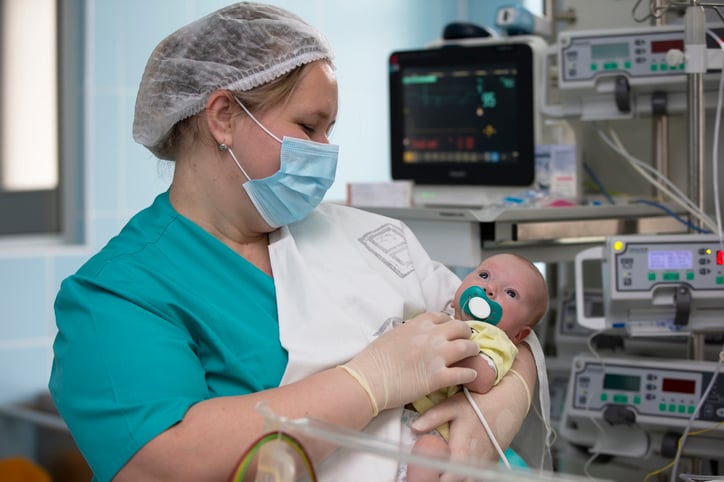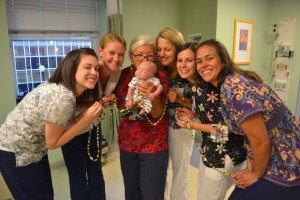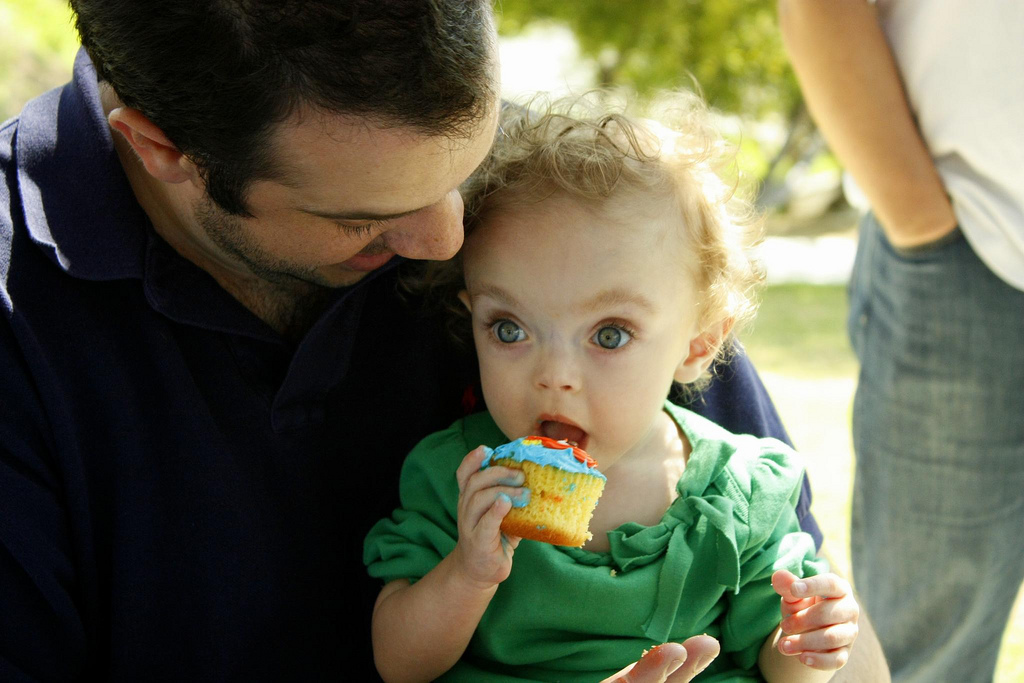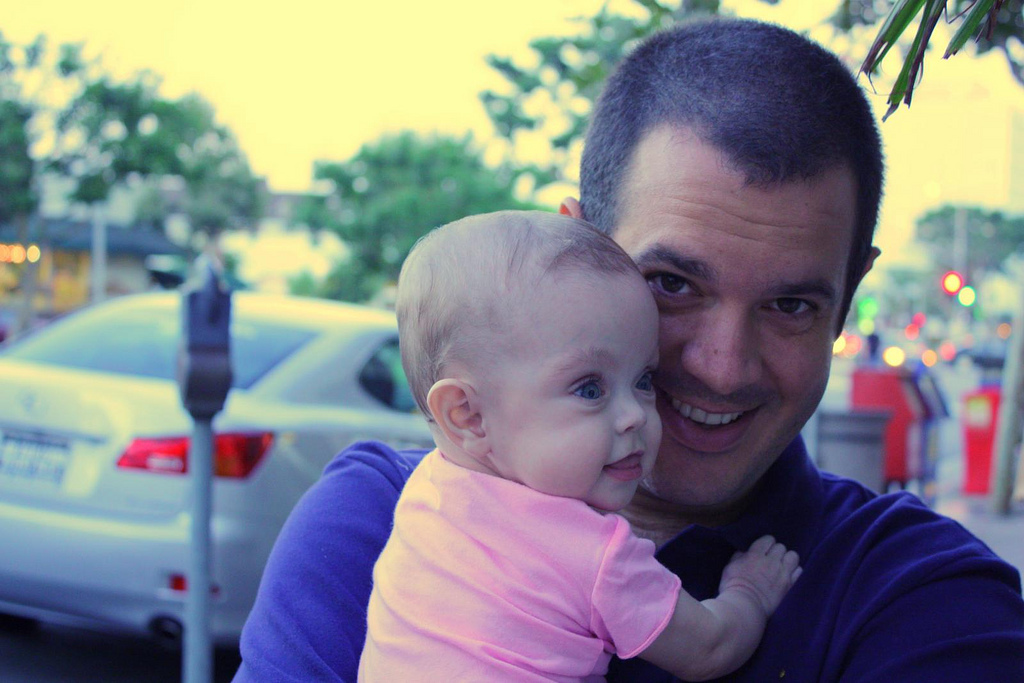By Michelle Matthews
Source: www.al.com

Shortly before their baby, Eli, was born, Brandi McGlathery and Troy Thompson talked about the physical qualities they hoped he would possess.
"I said I wanted him to have blond hair," Brandi said. "And Troy said, 'I hope he doesn't get my nose.'"
At the time, it was just a joke between two parents anxiously awaiting their baby's arrival. After Eli was born, though, it became the kind of memory that now makes them wince at its irony.
When Eli was born at South Baldwin Hospital on March 4, weighing 6 pounds, 8 ounces, Dr. Craig Brown immediately placed him on Brandi's chest. As the doctor helped Troy cut the cord, Brandi looked at Eli for the first time.
"I pulled back and said, 'Something's wrong!' And the doctor said, 'No, he's perfectly fine.' Then I shouted, 'He doesn't have a nose!'"
The doctor whisked Eli away, and for about 10 minutes Brandi was left alone in the delivery room thinking surely she hadn't seen what she thought she saw - or didn't see.
When Dr. Brown returned, he put his arm on her bed and took a deep breath. "He had the most apologetic look," she said. She knew something was wrong with her baby. She started to cry before he said a word.
She looked to Troy, who, she said, never cries. He had tears in his eyes.
She'd been right. Eli didn't have a nose.
Meanwhile, he had started breathing through his mouth right away. She remembers that he was wearing a tiny oxygen mask. Not having a nose "didn't faze him at all," she said.
"I was the first person to see it," she said. "Even when they took him away, my family still didn't know something was wrong, due to being caught up in the excitement of his arrival. It wasn't until they opened the blinds of the nursery that everyone else saw."
Before she knew it, Eli was taken to USA Children's and Women's Hospital in Mobile. Throughout the night, Brandi called the number they'd given her every 45 minutes or so to check on her baby. She wasn't sure he would make it through the night -- but he did.
And her "sweet pea," her "miracle baby," has been surprising his parents and others who love him, as well as the medical staff who have cared for him, ever since.
Nothing unusual
The next day, her doctor checked her out of the hospital in Foley so she could be with her baby in Mobile. The doctor had also had a sleepless night, she said. "He said he'd gone back over every test and every ultrasound," but he couldn't find anything unusual in her records.
There were a few aspects of her pregnancy that were different from her first pregnancy with her 4-year-old son, Brysen.
Right after she found out he was a boy, at around 17 weeks, she said, she lost 10 pounds in eight days because she was so severely nauseated. Her doctor prescribed a medication that helped her gain the weight back and keep her food down. She continued to take the medication throughout her pregnancy, she said.
On a 3D ultrasound, she and Troy even commented on Eli's cute nose. The imaging shows bone, not tissue, she said - and he has a raised bit of bone beneath the skin where his nose should be.
After going into early labor three times, Brandi delivered Eli at 37 weeks. At 35 weeks, her doctor told her that the next two weeks would be critical to the development of the baby's lungs and respiratory system. "He said, 'Let's try to keep him in as long as we can,'" she remembered.
Happy, healthy baby
For the first few days of his life, Eli was in one of the "pods" in USA Children's and Women's Hospital's neonatal intensive care unit. At five days old, he had a tracheotomy. "He has done wonderfully since then," Brandi said. "He's been a much happier baby."
Because of the trach, he doesn't make noise when he cries anymore, so Brandi has to watch him all the time. She has been going back and forth between the Ronald McDonald House and Eli's room during his stay.
"Between the nurses here and Ronald McDonald House, everyone has gone above and beyond," she said. "The nurse from the pod comes to check on her 'boyfriend.' She got attached to him."
Besides not having an external nose, he doesn't have a nasal cavity or olfactory system. (Despite that fact, she said, he sneezes. "The first time he did it, we looked at each other and said, 'You heard that, right?'")
Eli Thompson has an extremely rare condition known as complete congenital arhinia, said Brandi, adding that there are only about 37 cases worldwide like his. The chance of being born with congenital arhinia is one in 197 million, she said.
Even at USA Children's and Women's Hospital, Eli's case has baffled the NICU. "Everyone has used the same words," Brandi said. As soon as they found out he was on his way, she said, the staff started doing research. They only found three very brief articles on the condition. Now, his doctors are writing a case study on him in case they ever encounter another baby like Eli.
After he got the trach, Brandi wanted to start breastfeeding. The lactation consultant encouraged her, and together they searched the Internet for more information. Brandi became the first mother ever to breastfeed a baby with a trach at the hospital, she said - and now the lactation consultant "is actually using him to put an article together about breastfeeding with a trach to encourage mothers of other trach babies to attempt it."
Thanks to her Internet research, Brandi found a mother in Ireland, Gráinne Evans, who writes a blog about her daughter, Tessa, who has the same condition as Eli. She also found a 23-year-old Louisiana native who lives in Auburn, Ala., and a 16-year-old in North Carolina, she said. With every case she found, Brandi started to feel better and more convinced that Eli could not only survive his babyhood, but that he'll grow to adulthood.
Communicating with Tessa's mother in Ireland has been especially gratifying for Brandi. She knows she and Eli are not in this alone.
'He's perfect'
While it would seem easy enough for a plastic surgeon to build a nose for Eli, it's not that simple, Brandi said. "His palate didn't form all the way, so his brain is lower," she said. "It's a wait-and-see game."
His condition affects his pituitary gland, she said. He'll have to be past puberty before his nasal passageways can be built. Until then, she'd like to spare him any unnecessary facial surgeries.
"We think he's perfect the way he is," she says, nodding toward the sweet, sleeping baby in his crib. "Until the day he wants to have a nose, we don't want to touch him. We have to take it day by day."
Within a month after Eli goes back home to Summerdale, he will have to travel to the Shriners Hospital for Children in Houston and Galveston, Texas, to meet with craniofacial specialists. "They will work with him for the rest of his life," she said. "Every three to six months, we'll be going back for scans and checkups for at least the next ten years."
Brandi said that, of the people she's found online, some are opting to have noses and nasal passageways built (including Tessa), while others haven't.
"We're going to do our best to make sure he's happy," she said. "The rest of him is so cute, sometimes you don't realize he doesn't have a nose."
Brandi's older son, Brysen, and Troy's four-year-old daughter, Ava, are too young to interact with Eli in the hospital. Brandi was grateful to one of the nurses who unhooked him and let the kids see him. "Ava asked me, 'When you were little, did you have a nose?'" Brandi said. "She said, 'I think he's cute.'"
Brysen pressed his hands against the window separating him from his baby half-brother and said, "He's perfect!"
'Facebook famous'
Brandi, who got pregnant with Brysen when she was a senior in high school, had planned to start going to school to become an LPN like Troy's sister and his mother. "That's all on the back burner now," she said. Because of her experience at USA Children's and Women's, she said she now wants to be a NICU nurse.
Her best friend, Crystal Weaver, logged onto Brandi's Facebook account and created the Eli's Story page to let friends and family members know what was going on. "It's easier that way to update everyone at once rather than to call everyone individually," Brandi said. "It's overwhelming. It's all on my shoulders." Within a day, she said, Eli's Story had 2,000 likes (it now has around 4,500). "People I didn't know were sending messages," she said.
Crystal also started a Go Fund Me account, which has raised about $4,300. "We've got years and years of surgeries and doctor's appointments nowhere close to us," said Brandi, who returned to her job as a bartender this past weekend. She plans to keep working two nights a week for a while. Being around her work family, she said, helps her maintain a sense of normalcy.
A fish fry is planned as a fundraiser for Eli's medical fund on April 11 at Elberta Park in Elberta, with raffles for prizes including a weekend stay at a condo in Gulf Shores and a charter fishing trip.
"It makes me feel really good that I have a support system," Brandi said. "Everybody's been awesome."
Updating Eli's page, adding photos and reading the positive, encouraging comments from hundreds of people, as well as reaching out to others who have been through what she's going through "keeps me sane," Brandi said.
Recently, Brandi posted a video of Eli waking up from a nap. From Ireland, Gráinne Evans commented: "I've actually watched this more times than I could admit!"
Eli is "100 percent healthy," she said. "He just doesn't have a nose. He has a few hormone deficiencies, but other than that he's healthy."
Brandi seems wise beyond her years. She is already worried about "the day he comes home and someone has made fun of his nose," she said. "We don't want anyone to pity him. We never want anyone to say they feel sorry for him. If other people express that, he'll feel that way about himself."
She jokes that Eli is "Facebook famous" now. "I can't hide him," said Brandi, who is a singer. "Eli's gotten more publicity in the past two weeks than I have in my whole life!"
She's been putting together a "journey book" full of medical records and mementoes to give Eil one day. "I'm excited to show him one day, 'Look, from the moment you were born people were infatuated with you.'"
'I'm doing something right'
In his short time on earth so far, Eli has brought his family together, Brandi said. She and Troy had been engaged, then called off the wedding and were "iffy," and then they broke up. A week later, she found out she was pregnant.
"Eli has made Troy my best friend," she said. "He has brought us closer than when we were engaged. To see Troy with him is really awesome."
Troy has been her rock, reassuring her since Eli was born, she said. "He tells me, 'Brandi, it's OK. It will end up happening the way it's supposed to be."
Last Thursday, Brandi posted on the Eli's Story page that Eli had passed his car seat trial and newborn hearing screening. "He now weighs 7 pounds, and we'll be meeting with home health to learn how to use all of his equipment so we can go home Monday."
Everyone in their family has taken CPR classes, and Brandi and Troy have learned how to care for Eli's trach. The couple has extended family nearby, and Troy's father and stepmother plan to move to Baldwin County from Mobile to be closer to Eli.
As she prepared to take her baby home from the hospital on Monday morning, almost four weeks since he came into the world, Brandi was excited to take care of him for the first time in the comfort of her own home, and to finally introduce him to his big brother and sister.
Though Brandi said her heart melts when Eli's little hand wraps around her finger, he's the one who already has her wrapped completely around his. He recognizes his parents' voices, and seems comforted by them. "As soon as he hears us, he looks around for us, finds us, then stares at us smiling," she said. "It makes me feel like I'm doing something right, that through the ten to twelve other women, the nurses who have been caring for him for the past month, he still knows who Mommy is!"
 If you're interested in joining the Nursing field, or changing your Nursing Specialty, you'll want to learn more about which Specialty is the right fit for you.
If you're interested in joining the Nursing field, or changing your Nursing Specialty, you'll want to learn more about which Specialty is the right fit for you.

 Infants born preterm are known to be at greater risk for neurodevelopmental disorders. Now, a new study by researchers from King's College London in the UK brings us closer to understanding why - premature birth reduces connectivity in brain regions linked to cognitive functioning.
Infants born preterm are known to be at greater risk for neurodevelopmental disorders. Now, a new study by researchers from King's College London in the UK brings us closer to understanding why - premature birth reduces connectivity in brain regions linked to cognitive functioning.

 therapies, medical emergencies and other medical procedures. Her medical team was not sure she would survive, or whether she would be able to eat or walk if she did survive.
therapies, medical emergencies and other medical procedures. Her medical team was not sure she would survive, or whether she would be able to eat or walk if she did survive.
 determining that Maddie's lungs were immature, rushed her to the NICU. There Maddie's life hung in the balance, and though my wife, Heather, and I longed to care for her ourselves, her condition made it so that we couldn't. We had to trust the NICU nurses to take care of our baby for us, and that was incredibly hard -- especially at night when we went home to catch a few hours sleep.
determining that Maddie's lungs were immature, rushed her to the NICU. There Maddie's life hung in the balance, and though my wife, Heather, and I longed to care for her ourselves, her condition made it so that we couldn't. We had to trust the NICU nurses to take care of our baby for us, and that was incredibly hard -- especially at night when we went home to catch a few hours sleep. named Maddie (also "Bunny" or "Little Mama" as they called her), who was beautiful and strong. I could see that they considered my daughter to be amazing and a gift, and to see others felt about her as I did was incredibly meaningful to me.
named Maddie (also "Bunny" or "Little Mama" as they called her), who was beautiful and strong. I could see that they considered my daughter to be amazing and a gift, and to see others felt about her as I did was incredibly meaningful to me.